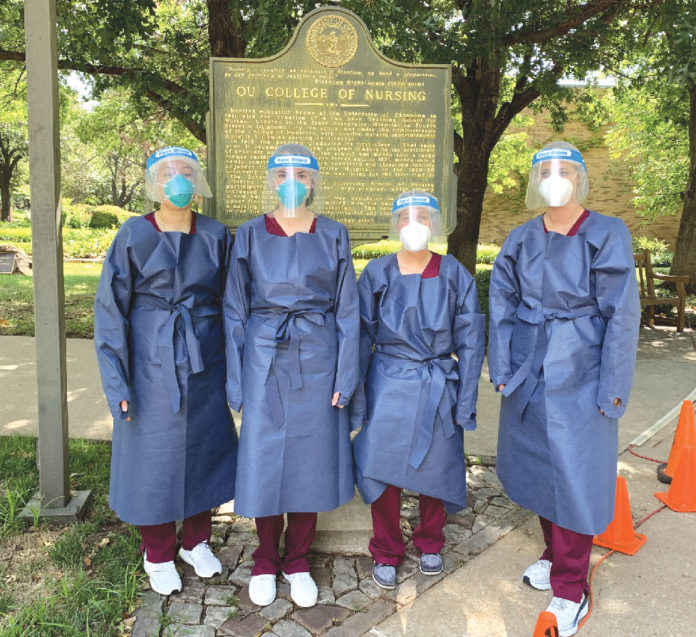
by Bobby Anderson, RN – staff writer/photographer
With Covid-19 putting a halt to clinical education in nursing schools across the country, the University of Oklahoma Fran and Earl Ziegler College of Nursing is finding innovative ways to bring students back to the health care setting.
In Oklahoma City and in Tulsa, OU nursing students are manning Covid testing stations, doing their part to fight the virus and advance their knowledge of nursing practice at the same time.

FULL TIME & PART TIME REGISTERED NURSES & Mental Health Technicians
· Competitive Wages
· Comprehensive Benefits Program
Full-Time RN Sign-On Bonus: $3000-$7500
JOIN OUR TEAM
www.cedarridgebhs.com/careers
Teri Murphy, MSN, MPH, RN-BC, PHCNS-BC is a clinical instructor at the college with a focus on community health.
The clinics were initially run by staff from OU Physicians and Murphy said they streamlined and adapted the process integrating College of Nursing students.
“We realized we’ve got a great opportunity for students to be in contact with patients, families and the community again,” Murphy said. “We had such a long period of time last semester where things were changing daily and we had to ensure the safety of the students, clinical education was limited.”
Murphy said traditional undergraduate and graduate students worked the stations in collaboration with faculty and OU nursing alumni.
“It’s kind of a group effort,” Murphy said. “When we have two or three students together they’re learning teamwork principles.”
Murphy said these clinics support the need to increase the daily number of individuals getting tested in Oklahoma.
The test – and the corresponding education provided by students – may be the only opportunity these individuals have to information about Covid-19.
The clinics are offered at both OU campuses in Oklahoma City and Tulsa.
“The students are so excited by the opportunity to contribute during the pandemic,” Murphy said. “They really missed not having access to clinical towards the end of the last semester. I’m sure – just like a lot of nurses that work in clinics that were shut down for a while – you miss working. You miss your patients. You want to have those interactions.”
“They’ve just been really thankful and grateful.”
Murphy believes students are learning more in the therapeutic communication realm than anything else. The brief encounters give students opportunities to listen and teach.
They also allow them to impart knowledge and help an already-scared patient calm down by allowing them to ask questions and just let the students know what they’re feeling.
“When this opportunity came up, we thought it would be a way to allow students to interact with and talk to patients, dealing with real-life scenarios, and prepare them to be Covid-ready nurses,” Murphy said. “It’s been great so far. It’s just a nasal swab, but they’ve really enjoyed the opportunity to contribute during a pandemic.”
Murphy has dual master’s degrees in nursing and in public health. The entire world has become one big classroom for her students.
“This is my jam,” Murphy said. “We’re talking about contact tracing, vaccines, the importance of science, and policy and law changes.”
“I think there are going to be a lot of people that maybe change their opinion about public health and that maybe it’s a cool thing to do.”
Emma Kientz, DNP, APRN-CNS, CNE is an assistant dean for the College of Nursing programs in Tulsa and works with the Tulsa clinic.
“The biggest thing is, it’s an opportunity for all our students to learn what goes on in a situation like this. It’s not something that happens every day,” Dr. Kientz said. “For me it’s nice to be involved, however much we can, and do whatever we can do safely rather than just sit on the sidelines.”
“And I think that’s pretty cool.”
Dr. Kientz works with the Tulsa clinic which is located in a three-story parking garage.
Patients drive in, drive through and drive out.
Four days a week, students staff the clinic at the OU Schusterman campus and rotate to the Wayman Tisdale Specialty Health Clinic for another day.
A once in a lifetime pandemic creates a once-in-a-lifetime learning opportunity.
“You think about what you’ll tell your grandkids years from now,” Dr. Kientz remarked.
Kientz agrees the fall semester will likely be highly fluid.
“You don’t know what’s going to happen,” she said. “We’re trying to make modifications as we can to keep the students safe yet provide them the best learning opportunities.”
“I think across all three of our sites – Lawton, Oklahoma City and Tulsa – we have excellent clinical partners that we work with and they understand the plight of trying to educate students because they want nurses and they need nurses.”
Classes will continue this fall. Students will be involved in active learning activities, online and virtual clinical simulation, and will attend clinical. Murphy noted when students come to campus they will do so in small groups and be spaced six feet apart in the classroom.
“We are doing everything we can to keep students healthy so they can participate in clinical,” Murphy said. “We are being intentional, collaborating across sites, and have multiple what-if plans. We’re trying to get everything in line as we possibly can to ensure the continued academic success of our students.”












